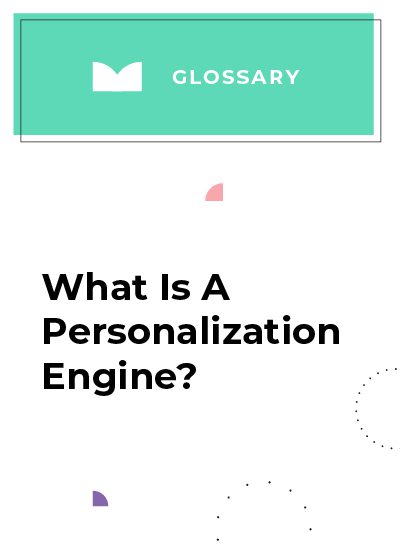
What Is a Personalization Engine?
A personalization engine is a powerful tool that uses artificial intelligence (AI) and machine learning (ML) to analyze user data and behavior to create customized digital experiences for individual users, across all channels. By understanding user preferences, interests, and browsing history, personalization engines can tailor content, recommendations, and marketing messages to improve user engagement, satisfaction, and conversion rates.
How a Personalization Engine Works
Personalization engines are sophisticated tools designed to create customized user experiences, leveraging a blend of technology and data analysis. Here’s a concise breakdown of their working mechanism:
- Data Collection and Analysis: A personalization engine starts by collecting user data, such as browsing history, purchase records, and interactions. This data is constantly gathered, allowing for a real-time understanding of each user’s preferences.
- Artificial Intelligence and Machine Learning: The core of a personalization engine is its use of AI and ML algorithms. These technologies process the collected data, identifying patterns and predicting user preferences. As more data is gathered, the engine’s recommendations become more accurate and personalized.
- Filtering Techniques: Personalization engines use filtering techniques like collaborative filtering (recommendations based on user group behavior) and content-based filtering (recommendations based on item characteristics). Many engines combine both methods for enhanced accuracy.
- Real-Time Customization: These engines adapt in real-time to user interactions, updating their profiles and modifying recommendations to ensure relevance and engagement.
- Enhancing User Experience: The ultimate goal is to enhance the user experience by delivering tailored content and recommendations, thereby improving engagement, satisfaction, and brand loyalty.
- Continuous Learning: Personalization engines continuously learn from user responses, evolving their algorithms to align with changing preferences and behaviors.
Personalization engines represent a dynamic intersection of data, technology, and user experience. By intelligently analyzing user data and employing advanced algorithms, these engines not only personalize the user journey but also drive meaningful engagement and business growth.
As technology continues to evolve, the sophistication and effectiveness of personalization engines are set to reach new heights, making them an indispensable tool in the digital marketing arsenal. Embracing this technology means staying ahead in the ever-competitive digital landscape, offering experiences that resonate personally with each user.
How a Personalization Engine Can Help Your Business
A website personalization engine is a revenue-increasing tool for your online business. It’s a technology that tailors an ecommerce site as the customer shops, customizes communications for each respective shopper, and increases revenue through the implementation of certain capabilities like personalized recommendations.
Personalized Shopping Experiences
It’s possible for each of your customers to have a personalized shopping experience every time they visit your site. A personalization engine creates a unique profile for each visitor in real time as he or she browses and shops. Once a customer profile is created, AI-driven software makes adjustments and additions as the customer inputs more information. Their shopping habits and browsing patterns provide details about their interests and needs. This information can be leveraged to create a site that is of greater interest to that particular customer upon each visit. This keeps him engaged within the site and interested in the merchandise.
Customized Communications
Information collected and analyzed by a personalization engine can also be used to create communications that grab the attention of the customer and encourage him to return to your site. Each email, from receipts to newsletters, can become a personal note to your customer.
This kind of attention to detail creates customer loyalty. It also give the customer a reason to return to your site. That reason will ultimately be different for each visitor, but a personalization engine can capture the details needed to discover it eventually.
Increased Revenue
When you can show your customer personalized recommendations while shopping, you give them options they may not have known were available. Increasing your customers’ choices leads to increasing the number of items purchased per sale and the dollar amount made per purchase. In the end, this optimizes a site’s revenue and strengthens your bottom line.
Using personalization software will benefit your site’s sales, communications, as well as the overall experience your customer receives. By gathering information you can give your customer the type of relevant results today’s sophisticated shopper craves.
Key Components of a Personalization Engine
The effectiveness of a personalization engine lies in its core components, each playing a crucial role in delivering a tailored user experience:
- Data Collection and Management: Essential for organizing and utilizing user data, including browsing patterns, purchases, and social interactions.
- Machine Learning and Algorithms: These analyze user data for pattern recognition, enabling accurate recommendations and adaptive personalization.
- User Segmentation: Categorizing users based on behaviors and preferences to ensure targeted personalization.
- CMS Integration: Necessary for dynamically modifying and presenting content in real-time.
- Recommendation Systems: Suggest relevant products or content to enhance user engagement.
- Real-Time Analytics: For immediate decision-making and adapting experiences to user interactions.
- Multichannel Support: Ensuring a consistent personalized experience across web, mobile, and other platforms.
- Privacy and Compliance Protocols: Including GDPR compliance and user data security.
- Scalability: Capability to handle growing user bases and data volumes.
- User Feedback Integration: Utilizing user feedback to refine personalization strategies.
In order to function effectively, a personalization engine must:
- Aggregate and manage data from various sources for comprehensive user understanding.
- Seamlessly integrate with different platforms for a unified user experience.
- Empower marketers to create and deploy personalized content and recommendations.
- Utilize advanced techniques like machine learning, user segmentation, and A/B testing for refining user profiles.
These components and functionalities define a personalization engine, making it a powerful tool for customizing digital experiences and enhancing user engagement.
What Type of Companies Benefit from Personalization Engines
Personalization engines are not limited to a specific sector; they offer widespread benefits across various industries. Here’s a look at some types of companies that can significantly benefit from implementing personalization engines:
- E-commerce and Retail: These companies can use personalization engines to recommend products based on browsing history and purchase behavior, enhancing the shopping experience and increasing sales.
- Content Providers and Media: For companies in media and content delivery, personalization engines can suggest articles, videos, or music based on user preferences, increasing engagement and time spent on the platform.
- Travel and Hospitality: Personalization engines help tailor travel recommendations and hospitality services to individual preferences, improving customer satisfaction and loyalty.
- Financial Services: Banks and financial institutions can offer personalized financial advice, product recommendations, and tailored content to clients, enhancing customer service and relationship management.
- Healthcare Providers: In healthcare, personalization engines can assist in delivering personalized patient care plans and health-related content, improving patient engagement and outcomes.
- Educational Institutions: For e-learning platforms and educational institutions, personalization can tailor learning experiences to individual student needs, optimizing educational outcomes.
- Marketing Agencies: Agencies can leverage personalization engines to create highly targeted campaigns for clients, improving campaign effectiveness and ROI.
- Technology Services: Tech companies can use personalization to recommend software solutions or tech products, based on user behavior and needs.
Although these types of businesses greatly benefit from using a personalization engine, any company that interacts with customers through digital channels can harness the power of personalization engines to deliver a more relevant, engaging, and effective user experience.

Elevating Digital Experiences through Personalization
In the rapidly evolving digital landscape, personalization engines have emerged as a pivotal technology for businesses seeking to stand out and connect with their audience on a deeper level. These engines not only enhance the user experience but also drive significant improvements in engagement, loyalty, and revenue.
From e-commerce giants to small content creators, the versatility of personalization engines makes them a valuable asset for a wide range of industries. As we continue to move towards more customer-centric business models, the role of personalization engines in delivering tailored, meaningful interactions will only grow in importance. Embracing this technology is not just about keeping up with the competition; it’s about setting new standards in customer experience and engagement.